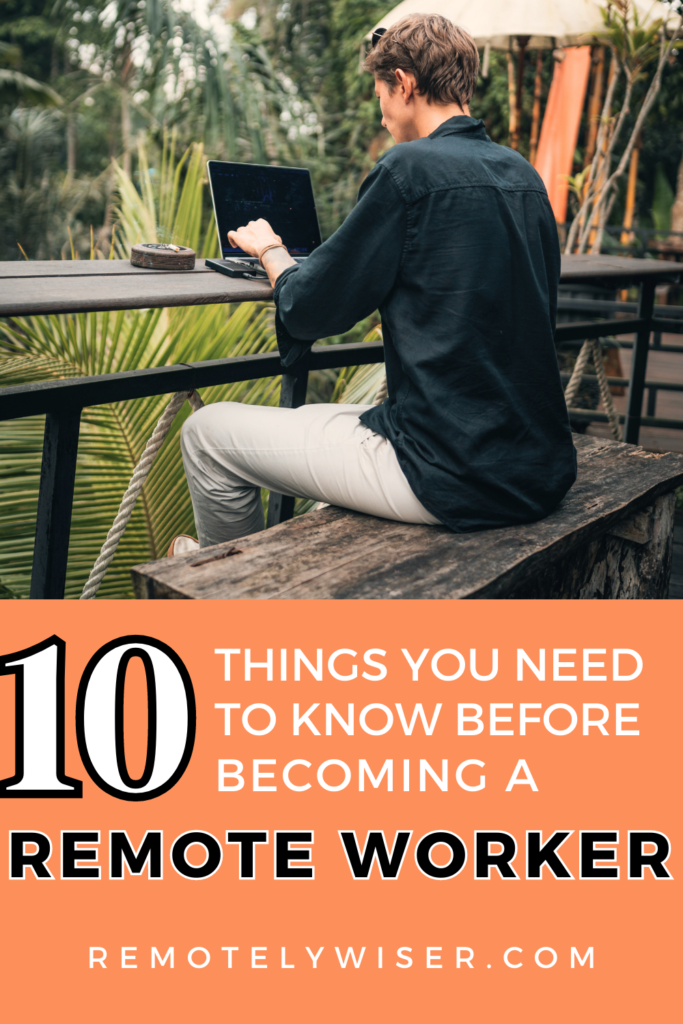These are the most important things you need to know and consider for yourself before becoming a remote worker.
Working virtually is a fantastic lifestyle that offers a lot of flexibility. However, it’s also challenging and not for everyone.
After reading through this article, you can determine whether remote work is right for you.
If you want to know what it takes to land a remote job, check out my post: How To Land Your First Remote Job.
1. To be a successful remote worker, you must be self-disciplined
We’re starting the list with the most challenging part of remote work, self-discipline.
Holding yourself accountable is the most crucial characteristic of a remote worker. Since you’re not in a traditional office setting and can do what you please during most of the day, you have to be self-motivated enough to complete your work on time.
A remote worker without the self-discipline to be productive will not find success in the digital workforce.
2. Working remotely from (virtually) anywhere is not as glamorous as it seems.
Many people think remote workers travel the world, working only a few hours each day on a beach somewhere. Truth is, that’s far from the reality of most.
Yes, remote workers can work anywhere with a WIFI connection.
Yes, there are digital nomads traveling without working full-time. But those are the exceptions, not the rule.
A lot of remote workers work from home (WFH). Usually from a makeshift office, balancing family and other responsibilities without a clear boundary between work and home life. This leads to my next point.


3. No commute? More time to work
Remote workers tend to work more hours. A survey found that 78% of remote-working respondents said they work more than 40 hours per week.
When the work is always with you, it’s easy to go beyond the 8-hour work day.
Since less time is spent on getting ready in the morning and there’s no more commuting to and from an office, the additional time workers gain back is usually spent on (you guessed it)…working more.
While not all (good) companies expect their workers to be connected at all hours, this is a common struggle among remote workers.
4. You must be very organized
If you’re not organized, you’ll struggle at remote work. You have to keep your email inbox, and computer files in order. If not, you’ll constantly forget or misplace something.
I find organizing emails by project, creating subfolders, and moving emails from the inbox into subfolders is best. When saving documents, I recommend naming them by a description, version number, and date.
Using a to-do list to stay on track is also a great tool. Whether written in a notebook or kept digitally, they are essential for tracking tasks. Either way, you have to create an organizational system that works for you.
5. Social interaction is limited as a remote worker
You have to be ok with being alone A LOT.
If you’re a social butterfly and prefer in-person interactions, remote work is not for you. Most days are spent solo in front of your computer. Meetings with colleagues or clients are all virtual.
I don’t mean to be a Debbie Downer, but I want to emphasize the reality that remote work is isolating.
Sure, you can go to a cafe to work and be surrounded by people, but that is extremely distracting nor a good place to take calls.
6. You have to manage distractions
There are many distractions when remote working. Getting anything done will be extremely difficult if you’re easily distracted.
Have a dedicated workspace, put your phone in another room, and do whatever you need to limit distractions. You can take breaks throughout the day but don’t overdo it by being away from your computer for hours.
7. Remote workers have to be good with technology
Unlike in an office setting, you can’t run over to your IT Department when something goes wrong with your computer. You’ll still have IT support remotely, but there’s significantly more troubleshooting you’ll do alone.
8. You need a good time management system as a remote worker
This goes along with self-discipline. You must have a good time management system to stay on track. Whether you use a physical or digital calendar, scheduling your time and planning your tasks for the week is necessary.
10. Setting boundaries is necessary
Remote workers are more likely to experience burnout compared to others working in an office setting.
Again, work is always with you as a remote worker. Emails can be accessed on mobile phones, and it’s easy to be connected at all hours of the day. Shutting it off is nearly impossible.
A reminder for remote workers is that the majority of the work and emails can wait until tomorrow. Working around the clock won’t get you that promotion.
Unless it’s extremely urgent, don’t disrespect others by sending emails at all hours of the day. Create healthy boundaries, and don’t sacrifice your work-life balance.
Did you find this list helpful? In the comments below, tell me if you have any other concerns about becoming a remote worker.


